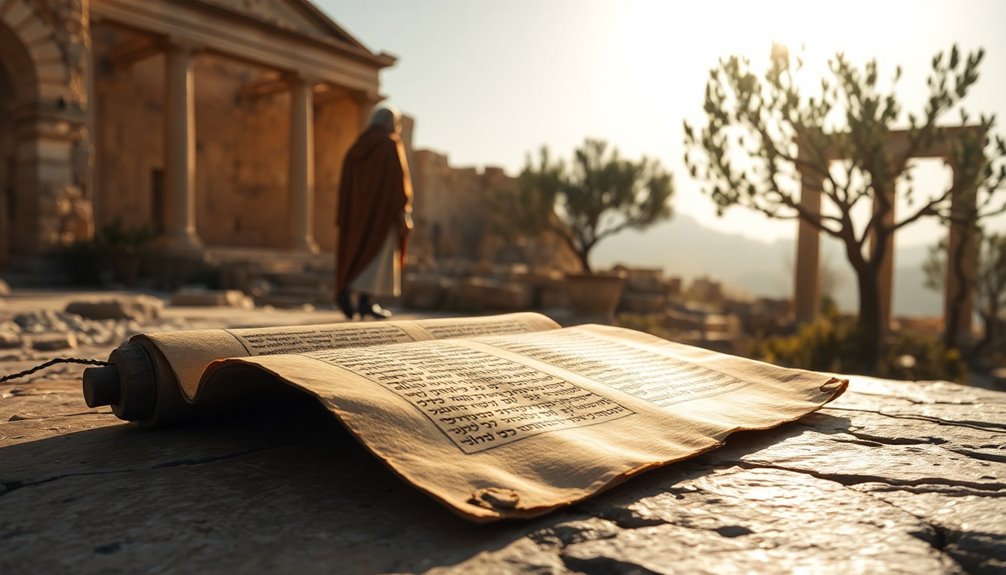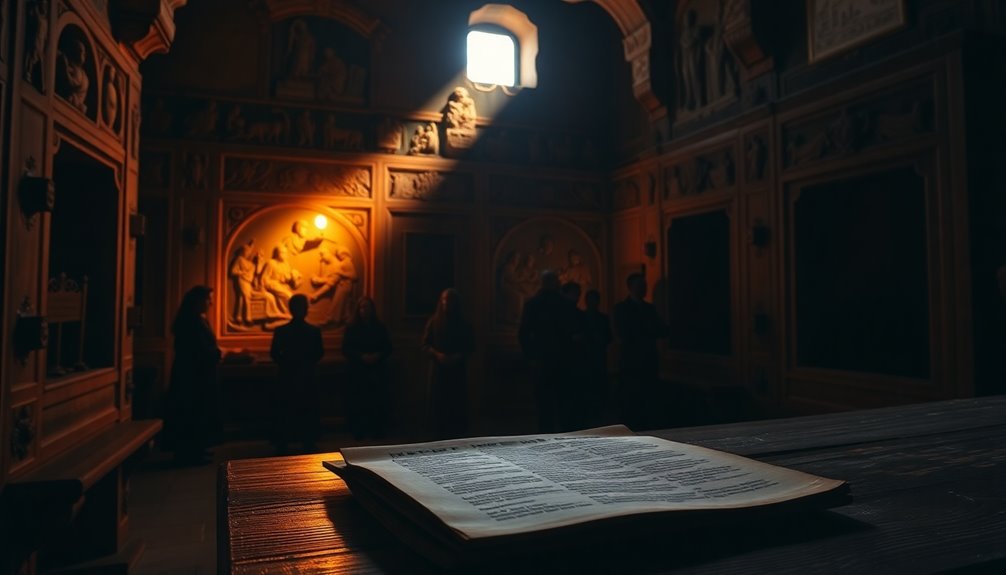The Old Testament is rich with prophecies that point to Jesus as the Messiah. For instance, Isaiah 7:14 speaks of the virgin birth, while Micah 5:2 identifies Bethlehem as His birthplace. Isaiah 53 describes Him as a suffering servant, foreshadowing His sacrifice, and Genesis 49:10 predicts a ruler from the tribe of Judah. With over 300 prophecies fulfilled in Jesus' life, you'll see how these scriptural connections strengthen Christian faith. Understanding these prophecies invites deeper insight into His divine mission and significance, which you might find intriguing as you explore further.
Key Takeaways
- Over 300 Old Testament prophecies connect to Jesus, highlighting His birth, ministry, death, and resurrection.
- Isaiah 7:14 predicts the virgin birth of the Messiah, fulfilled in Jesus.
- Micah 5:2 identifies Bethlehem as the birthplace of Jesus, aligning with prophetic expectations.
- Isaiah 53 depicts the suffering servant, foreshadowing Jesus' sacrificial role for humanity.
- New Testament references, particularly in Matthew, illustrate numerous fulfillments of Old Testament prophecies in Jesus' life.
Introduction

Many people find it fascinating that the Old Testament contains over 300 prophecies that Christians believe point to Jesus. These prophecies cover significant aspects of His life, including His birth, ministry, death, and resurrection. Each prophecy serves as a sign, illustrating the divine plan for the Messiah.
For instance, key Old Testament prophecies highlight important details surrounding Jesus' birth, such as His virgin birth foretold in Isaiah 7:14, His birthplace in Bethlehem as stated in Micah 5:2, and His lineage from David, which is found in Jeremiah 23:5-6. These fulfillments establish a clear connection between Jesus and the anticipated Messiah.
Additionally, prophecies concerning His ministry emphasize His teaching methods, as seen in Psalm 78:1-2, and His role as a healer, illustrated in Isaiah 35:5-6.
The probability of one individual fulfilling so many specific Old Testament prophecies is astronomically low, enhancing the significance of Jesus as the prophesied Savior. This remarkable fulfillment strengthens the foundation of Christian faith, reaffirming Jesus' identity as the Messiah and showcasing the seamless link between the Old and New Testaments.
Messianic Prophecies Overview

When you look at the prophecies about Jesus in the Old Testament, you'll find a rich tapestry of predictions that span His life.
Primary Bible references like Isaiah 7:14 and Micah 5:2 lay the groundwork, while secondary references further enrich our understanding.
Exploring these texts will reveal how deeply connected the Old Testament is to the New Testament's portrayal of Jesus as the Messiah.
Primary Bible References
Throughout the Old Testament, over 300 messianic prophecies lay the groundwork for the coming of Jesus, addressing crucial elements of His life and mission. Key prophecies pinpoint significant details, such as Isaiah 7:14, which announces the miraculous virgin birth of Jesus the Messiah. Additionally, Micah 5:2 highlights Bethlehem Ephrathah as the foretold birthplace, establishing a vital link to His humble origins.
The prophecies also delve into the nature of Jesus' ministry and purpose. Isaiah 53 depicts the suffering servant who bears the sins of many, emphasizing His role in salvation. This portrayal of suffering aligns perfectly with Jesus' ultimate sacrifice for humanity.
Furthermore, the genealogy of Jesus is crucial for understanding His rightful claim to the Messianic line. Genesis 49:10 foretells a ruler emerging from the tribe of Judah, which is confirmed through the lineage traced in the New Testament.
Matthew 1:23 explicitly cites Isaiah 7:14, reinforcing the connection between the prophecies and their fulfillment in Christ. These primary Bible references collectively paint a compelling portrait of Jesus as the long-awaited Messiah.
Secondary Bible References
While the Old Testament is rich with messianic prophecies, secondary references further illuminate the life and mission of Jesus. These prophecies about Jesus, estimated between 200 to 400, cover significant aspects of His life, including His birth, ministry, death, and resurrection.
For instance, Isaiah the prophet declared a crucial prophecy about Jesus in Isaiah 7:14, providing the sign: The virgin shall conceive. This prophecy is directly fulfilled by Jesus, showcasing His divine origin.
Additionally, Micah 5:2 specifies Bethlehem as the birthplace of the Messiah, a detail that the New Testament confirms. Daniel 9:24-27 is another key reference that Christians interpret as predicting Jesus' crucifixion and the destruction of Jerusalem, reinforcing His messianic identity.
Moreover, Isaiah 53 introduces the suffering servant theme, foreshadowing Jesus' sacrificial death for humanity's sins.
The New Testament authors frequently cite these Old Testament scriptures, emphasizing that Jesus fulfills these messianic expectations. In fact, Matthew alone contains around 54 references to fulfillments of prophecies, making it clear that the life and mission of Jesus are deeply rooted in these ancient texts.
Ancient Jewish Expectation of Messiah

The ancient Jewish expectation of the Messiah was largely shaped by prophetic texts that promised a future leader to restore Israel and bring about peace and justice. The prophet Isaiah foretold that a child is born, emphasizing hope and renewal. Many Jews looked for a son of David, someone who'd reclaim the throne and usher in an era of prosperity. They believed that light has dawned, signaling the end of oppression, especially in regions like Galilee of the nations.
This expectation often centered on a political and military leader, a Davidic Messiah who'd liberate them from their struggles. While some sects, like the Essenes, anticipated a more spiritual figure, the predominant view was one of triumph rather than suffering.
The death of Herod further fueled the belief that the long-awaited Messiah would soon appear to fulfill the everlasting covenant God made with His people.
Prophecies about the lineage of David and the birthplace of Bethlehem were integral to their understanding of the Messiah's identity and mission. For the ancient Jews, the Messiah represented hope, restoration, and divine intervention, deeply woven into their cultural and religious fabric.
Messianic Expectations in Judaism

Messianic expectations in Judaism center around the belief in a future anointed leader from the lineage of David who'll restore Israel and bring peace to the world. These expectations are deeply rooted in prophetic texts like Isaiah 11:1-10 and Jeremiah 23:5-6, which outline the characteristics and roles of the Messiah.
Traditional Jewish interpretations emphasize that this figure will enact political justice, rebuild the Temple in Jerusalem, and gather all Jews back to the land of Israel.
In early Jewish thought, the concept of a suffering Messiah is largely absent. Instead, there's an expectation of a victorious king who'll defeat Israel's enemies and establish a reign characterized by peace and righteousness.
Key prophetic texts, such as Daniel 9:24-27, are understood in the context of the Second Temple period rather than as predictions of Jesus' life and death.
The varied messianic expectations reflect both political and spiritual dimensions, illustrating the diverse hopes of the Jewish people during times of oppression and foreign rule.
Ultimately, these interpretations highlight a future where the Messiah brings about the restoration of Israel and fulfills the long-awaited promises found in scripture.
Messiah's Identity Across Cultures

When you think about the Messiah, it's clear that interpretations vary widely across cultures.
Many people hold misconceptions about who the Messiah is, shaped by different historical and cultural contexts.
Debunk Common Misconceptions
How do different cultures interpret the identity of the Messiah? In Christianity, Jesus is often seen as the fulfillment of Old Testament prophecies, particularly as a suffering Messiah. Jesus would teach that his mission was to serve and redeem, contrasting sharply with early Jewish expectations of a political leader who'd restore Israel.
Many Jewish scholars argue that the concept of a suffering Messiah doesn't align with their traditional views, leading to a significant divide in understanding.
Critical perspectives also highlight that various Old Testament verses don't explicitly predict a Messiah, raising debates about their relevance to Jesus' life. While Christians focus on the theological developments that emphasize Jesus' divine sonship and the fulfillment of expectations, Jews maintain a different interpretation, often viewing these claims skeptically.
Furthermore, the idea that Jesus would be despised, as prophesied, adds to the complexity of cross-cultural interpretations. The adaptation of Old Testament prophecies to fit Jesus' narrative reflects a notable shift in messianic understanding from Judaism to Christianity, showcasing how cultural contexts shape beliefs about the Messiah.
Cultural Interpretations of Messiah
Different cultures shape their understanding of the Messiah based on unique historical and theological contexts. For many Jews, the Messiah is often seen as a political liberator, a military leader who'll restore Israel. This expectation contrasts sharply with how Christians perceive Jesus Christ—as a spiritual savior and suffering servant, fulfilling Old Testament prophecies through his life, death, and resurrection.
In Islam, Jesus (known as Isa) is regarded as a prophet and messenger but doesn't fulfill the role of Messiah in the same way Christians believe.
In some African and Latin American cultures, the concept of the Messiah aligns with liberation theology, which emphasizes social justice and the fight against oppression. Here, the Messiah isn't just a figure of spiritual salvation but a champion for the marginalized.
Even within Christianity, cultural interpretations of messianic prophecies vary significantly among denominations. Some focus on the fulfilled prophecies present in Jesus' life, while others look forward to future messianic expectations yet to manifest.
These diverse perspectives highlight how the identity of the Messiah continues to evolve across cultures and time, reflecting the unique needs and beliefs of each community.
Faith in Daily Decisions

Every day, your choices can reflect your faith and impact those around you.
By embracing principles from Old Testament prophecies, you can make decisions that prioritize community service and compassion.
Trusting in God's promises can guide you through challenges and inspire you to serve others selflessly.
Daily Choices Reflecting Faith
In today's fast-paced world, the choices you make each day can profoundly reflect your faith and trust in God's guidance. Understanding that Jesus fulfilled over 300 Old Testament prophecies reinforces your belief in divine direction when making decisions.
Embracing His teachings encourages you to promote compassion and justice in your everyday interactions, as highlighted in Isaiah 61:1. Recognizing Jesus as the fulfillment of messianic prophecies, such as the virgin birth in Isaiah 7:14, inspires you to trust God's plan and choose faith over fear.
This mindset allows you to navigate life's challenges with confidence. The concept of Jesus as the suffering servant in Isaiah 53 calls on you to embody humility and service, reflecting Christ's character in your daily choices.
Moreover, the expectation of Jesus' eternal kingdom, as prophesied in 2 Samuel 7:12-13, urges you to prioritize decisions that align with eternal values instead of temporary gains.
Community Service Initiatives
Living out your faith through community service initiatives provides a powerful way to embody the principles you've embraced in your daily choices. When you engage in acts of service, you not only honor Jesus' teachings but also give hope and good news to those around you. As Matthew 25:40 reminds us, serving others is akin to serving Christ Himself.
Initiatives like food drives, homeless outreach, and tutoring programs reflect Jesus' call to care for the marginalized and needy. By participating in these efforts, you help create a community where nations shall know compassion and justice, echoing Old Testament prophecies.
Moreover, the bonds formed through these service projects foster unity among congregants, reflecting the communal spirit of Acts 2:44-47. As you serve together, you're not just helping a child or a family; you're building a fellowship that mirrors the body of Christ.
Research shows that individuals involved in community service report higher life satisfaction, proving that living out your faith through service brings fulfillment. In these moments, you realize that your actions would lead to a more compassionate world, honoring both your faith and the teachings of Jesus.
Prophecies Affirm Jesus' Divine Mission

Throughout the Old Testament, over 300 prophecies point to Jesus and His divine mission, weaving a narrative that reveals God's intentional plan for redemption. These prophecies not only predict His coming but also define His role in salvation. For instance, Isaiah 61:1 speaks of the anointed one bringing good news to the poor, a mission Jesus proclaims in Luke 4:18-19, affirming His divine purpose.
Psalm 22 offers vivid descriptions of suffering that align with Jesus' crucifixion, emphasizing His identity as the suffering servant. This portrayal highlights that His pain wasn't in vain but a crucial part of God's redemptive plan.
Additionally, Isaiah 9:6 refers to Jesus as "Mighty God" and "Prince of Peace," confirming His divine nature and authority as the Messiah.
Prophecies like Micah 5:2, which detail Jesus' birthplace in Bethlehem, further underscore God's meticulous design in sending Jesus to accomplish His divine mission. These fulfillments reinforce that Jesus isn't just a historical figure but the anointed one destined to transform lives and restore humanity's relationship with God.
Additional Resources

Exploring the vast array of resources available on Old Testament prophecies of Jesus can deepen your understanding of His significance. You'll find over 300 prophecies that cover His birth, life, ministry, death, and resurrection.
For instance, Isaiah 7:14 predicts a virgin birth and states you'll call Him Immanuel, while Micah 5:2 reveals He'll be born in Bethlehem. These prophecies aren't mere coincidences; scholars like Peter Stoner highlight the staggering probability of one person fulfilling just eight specific prophecies, akin to covering the state of Texas in silver dollars.
As you delve into these resources, pay special attention to Isaiah 53, which describes the Messiah as a suffering servant who was despised and rejected. This aligns closely with the accounts of Jesus' passion in the Gospels, emphasizing the good news of His redemptive mission.
Numerous New Testament authors, including Matthew and Luke, frequently cite these Old Testament prophecies, illustrating the profound continuity between the Testaments. By engaging with these texts, you'll gain a richer perspective on Jesus and the prophetic foundation of His mission amidst a land of deep darkness.
Frequently Asked Questions
How Many Prophecies of Jesus Are in the Old Testament?
You might find it fascinating that there are anywhere from 200 to 400 prophecies about a significant figure in ancient texts.
Scholars often debate the exact number, but they agree on the importance of these predictions.
Some research highlights specific prophecies, demonstrating how unlikely it's for one individual to fulfill them all.
This statistical unlikelihood points to something extraordinary about the fulfillment of these prophecies, making the topic even more intriguing for you to explore.
What Old Testament Prophets Prophesied About Jesus?
Several Old Testament prophets prophesied about the coming Messiah.
You'll find Isaiah, who spoke of a virgin birth and a suffering servant.
Micah declared that the Messiah would be born in Bethlehem, while Zechariah foretold His entry into Jerusalem on a donkey.
Daniel also predicted the timing of the Messiah's arrival and death.
Each of these prophets laid the groundwork for understanding the significance of Jesus in the New Testament.
What Are the Prophecies About the Coming of the Messiah in the Old Testament?
You'll find several significant prophecies about the coming Messiah in the Old Testament.
For instance, Isaiah predicts a virgin birth and names the child Immanuel. Micah reveals that the Messiah will be born in Bethlehem, while Isaiah describes Him with exalted titles, like Wonderful Counselor.
Genesis highlights His lineage, and Daniel even prophesies the timing of His coming and mission.
These prophecies create a foundation for understanding the Messiah's identity and purpose.
What Verses in the Old Testament Point to Jesus?
If you're looking for verses in the Old Testament that point to Jesus, you'll find several key references.
Isaiah 7:14 speaks of a virgin giving birth to Immanuel, while Micah 5:2 indicates the Messiah's birthplace as Bethlehem.
Isaiah 53 describes a suffering servant, foreshadowing Jesus' sacrifice.
Zechariah 9:9 mentions a king riding a donkey, and Psalm 22 vividly details the crucifixion, all aligning with New Testament accounts of Jesus' life.










